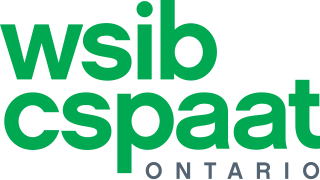
Workers' compensation or workers' comp is a form of insurance providing wage replacement and medical benefits to employees injured in the course of employment in exchange for mandatory relinquishment of the employee's right to sue his or her employer for the tort of negligence. The trade-off between assured, limited coverage and lack of recourse outside the worker compensation system is known as "the compensation bargain.” One of the problems that the compensation bargain solved is the problem of employers becoming insolvent as a result of high damage awards. The system of collective liability was created to prevent that and thus to ensure security of compensation to the workers.
In insurance, an accidental death and dismemberment (AD&D) policy provides financial benefits to the insured or their beneficiaries in the event of accidental death, serious injury, or dismemberment resulting from an accident.
Health insurance or medical insurance is a type of insurance that covers the whole or a part of the risk of a person incurring medical expenses. As with other types of insurance, risk is shared among many individuals. By estimating the overall risk of health risk and health system expenses over the risk pool, an insurer can develop a routine finance structure, such as a monthly premium or payroll tax, to provide the money to pay for the health care benefits specified in the insurance agreement. The benefit is administered by a central organization, such as a government agency, private business, or not-for-profit entity.

Kaplan, Inc. is an international educational services company that provides educational and training services to colleges, universities, businesses and individuals around the world. Founded in 1938 by Stanley Kaplan, the company offers a variety of test preparation, certifications, and student support services. The company is headquartered in Fort Lauderdale, Florida, and is a wholly owned subsidiary of Graham Holdings Company.

The Employee Retirement Income Security Act of 1974 (ERISA) is a U.S. federal tax and labor law that establishes minimum standards for pension plans in private industry. It contains rules on the federal income tax effects of transactions associated with employee benefit plans. ERISA was enacted to protect the interests of employee benefit plan participants and their beneficiaries by:
Maximus Inc. is an American government services company, with global operations in countries including the United States, Australia, Canada, and the United Kingdom. The company contracts with government agencies to provide services to manage and administer government-sponsored programs. Maximus provides administration and other services for Medicaid, Medicare, health care reform, welfare-to-work, and student loan servicing among other government programs. The company is based in Tysons, Virginia, has 39,600 employees and a reported annual revenue of $4.9 billion in fiscal year 2023.

Unum Group is an American insurance company headquartered in Chattanooga, Tennessee. Founded as Union Mutual in 1848 and known as UnumProvident from 1999-2007. The company is part of the Fortune 500. Unum Group was created by the 1999 merger of Unum Corporation and The Provident Companies and comprises four distinct businesses – Unum US, Unum UK, Unum Poland and Colonial Life. Its underwriting insurers include The Paul Revere Life Insurance Company and Provident Life and Accident Insurance Company.
A Health Reimbursement Arrangement, also known as a Health Reimbursement Account (HRA), is a type of US employer-funded health benefit plan that reimburses employees for out-of-pocket medical expenses and, in limited cases, to pay for health insurance plan premiums.

The Workplace Safety and Insurance Board (WSIB) is the workplace compensation board for provincially regulated workplaces in Ontario. As an agency of the Ontario government, the WSIB operates "at arm's length" from the Ministry of Labour, Training and Skills Development and is solely funded by employer premiums, administration fees, and investment revenue. The WSIB is one of the largest compensation boards in North America and is primarily responsible for administering and enforcing the Ontario Workplace Safety and Insurance Act (WSIA).
Workplace wellness, also known as corporate wellbeing outside the United States, is a broad term used to describe activities, programs, and/or organizational policies designed to support healthy behavior in the workplace. This often involves health education, medical screenings, weight management programs, and onsite fitness programs or facilities. It can also include flex-time for exercise, providing onsite kitchen and eating areas, offering healthy food options in vending machines, holding "walk and talk" meetings, and offering financial and other incentives for participation.
Sick leave is paid time off from work that workers can use to stay home to address their health needs without losing pay. It differs from paid vacation time or time off work to deal with personal matters, because sick leave is intended for health-related purposes. Sick leave can include a mental health day and taking time away from work to go to a scheduled doctor's appointment. Some policies also allow paid sick time to be used to care for sick family members, or to address health and safety needs related to domestic violence or sexual assault. Menstrual leave is another type of time off work for a health-related reason, but it is not always paid.
Self-funded health care, also known as Administrative Services Only (ASO), is a self insurance arrangement in the United States whereby an employer provides health or disability benefits to employees using the company's own funds. This is different from fully insured plans where the employer contracts an insurance company to cover the employees and dependents.
In the United States, health insurance helps pay for medical expenses through privately purchased insurance, social insurance, or a social welfare program funded by the government. Synonyms for this usage include "health coverage", "health care coverage", and "health benefits". In a more technical sense, the term "health insurance" is used to describe any form of insurance providing protection against the costs of medical services. This usage includes both private insurance programs and social insurance programs such as Medicare, which pools resources and spreads the financial risk associated with major medical expenses across the entire population to protect everyone, as well as social welfare programs like Medicaid and the Children's Health Insurance Program, which both provide assistance to people who cannot afford health coverage.

Germany has a universal multi-payer health care system paid for by a combination of statutory health insurance and private health insurance.
German Statutory Accident Insurance or workers' compensation is among the oldest branches of German social insurance. Occupational accident insurance was established in Germany by statute in 1884. It is now a national, compulsory program that insures workers for injuries or illness incurred through their employment, or the commute to or from their employment. Wage earners, apprentices, family helpers and students including children in kindergarten are covered by this program. Almost all self-employed persons can voluntarily become insured. The German workers' compensation laws were the first of their kind.
In the United States, direct primary care (DPC) is a type of primary care billing and payment arrangement made between patients and medical providers, without sending claims to insurance providers. It is an umbrella term, incorporating various health care delivery systems that involve direct financial relationships between patients and health care providers.
Molina Healthcare, Inc. is a managed care company headquartered in Long Beach, California, United States. The company provides health insurance to individuals through government programs such as Medicaid and Medicare.
Workplace health promotion is the combined efforts of employers, employees, and society to improve the mental and physical health and well-being of people at work. The term workplace health promotion denotes a comprehensive analysis and design of human and organizational work levels with the strategic aim of developing and improving health resources in an enterprise. The World Health Organization has prioritized the workplace as a setting for health promotion because of the large potential audience and influence on all spheres of a person's life. The Luxembourg Declaration provides that health and well-being of employees at work can be achieved through a combination of:

Bell Bank is a privately owned bank headquartered in Fargo, North Dakota, with assets of $13 billion. Bell Bank, which employs more than 1,900 people, has 27 full-service banking locations in North Dakota, Minnesota and Arizona, and mortgage locations in Arizona, Colorado, Florida, Kansas, Illinois, Minnesota, Missouri, New Mexico, North Dakota, Tennessee and Wisconsin. State Bankshares is Bell Bank's parent company.
Workers' compensation in the United States is a primarily state-based system of workers' compensation.







